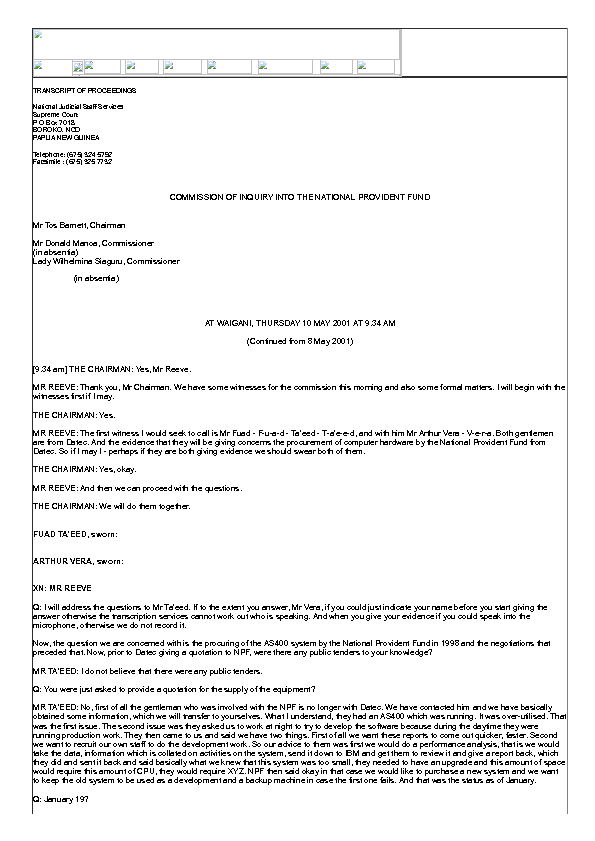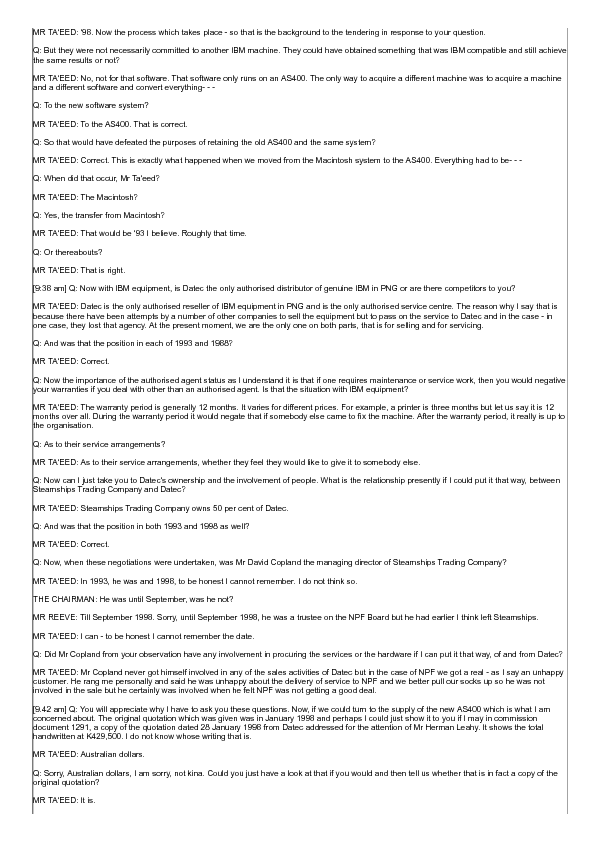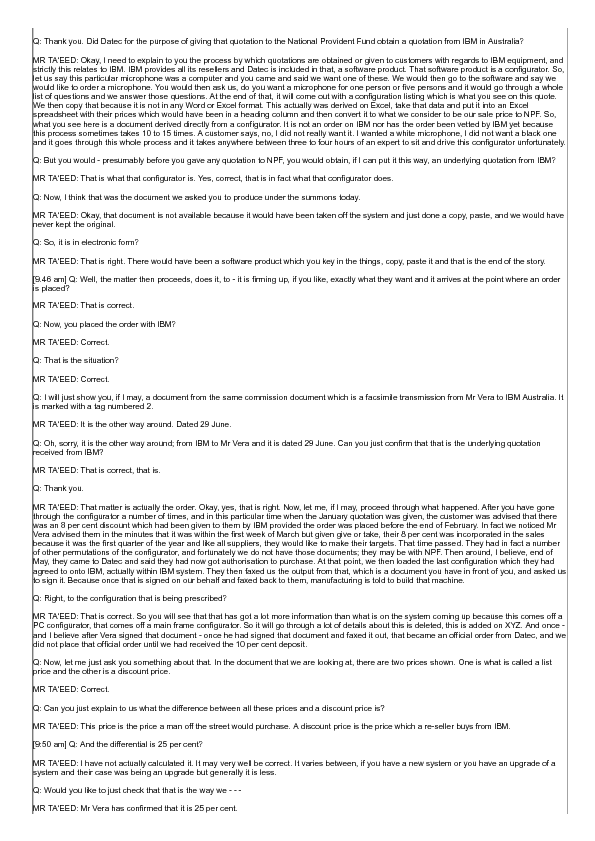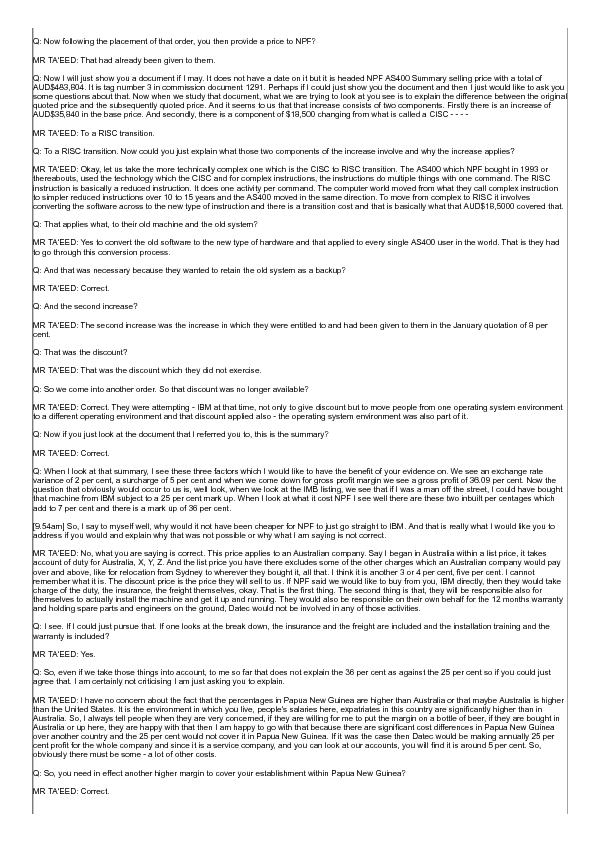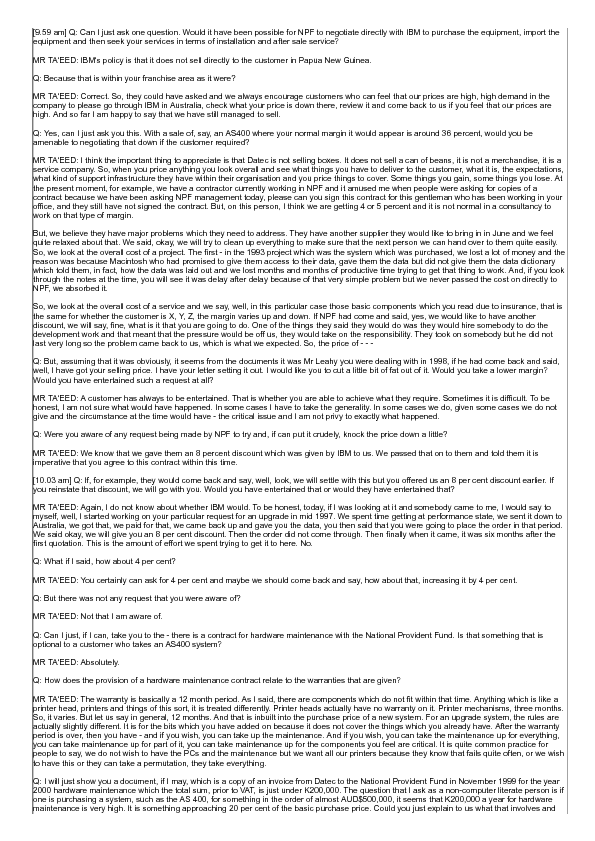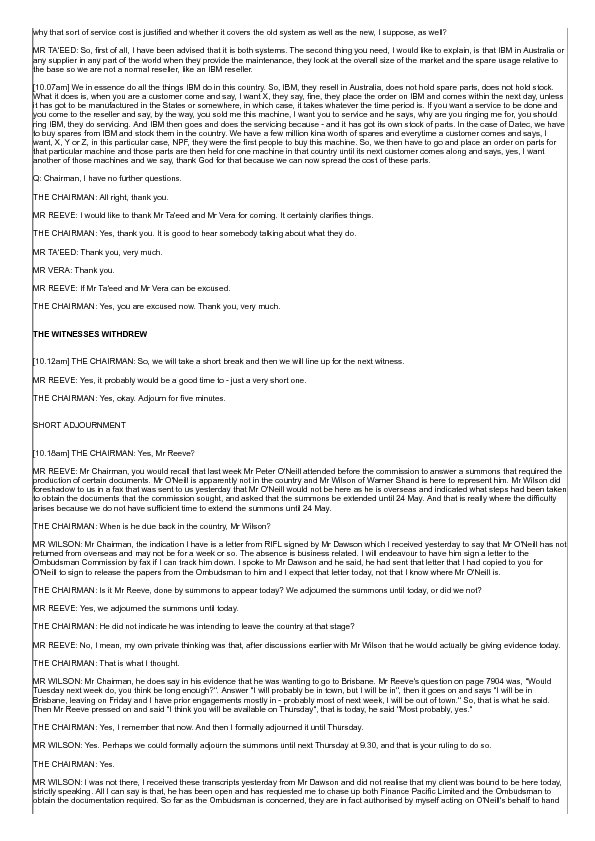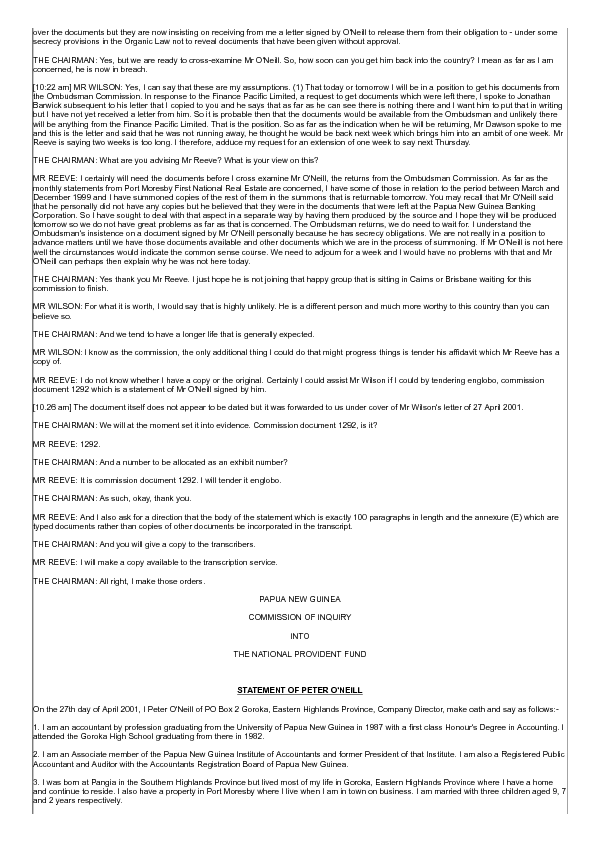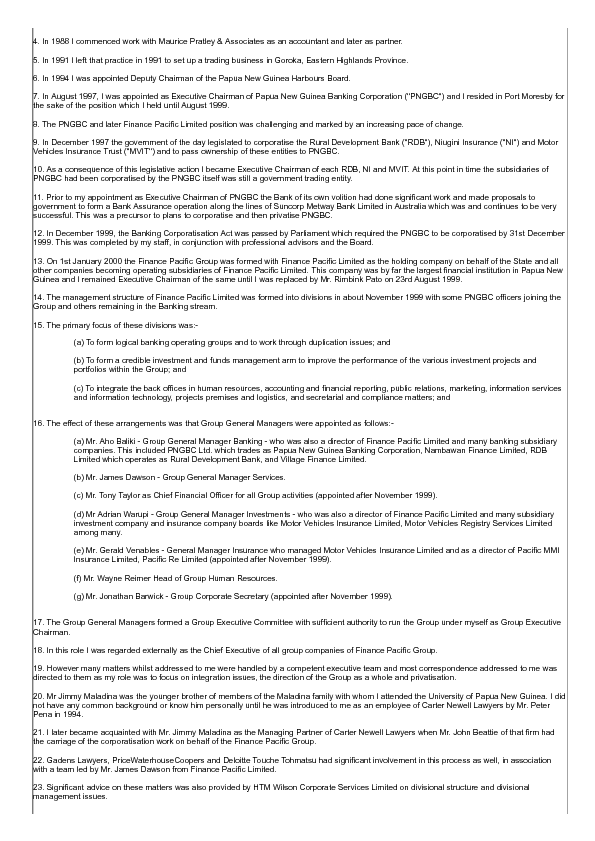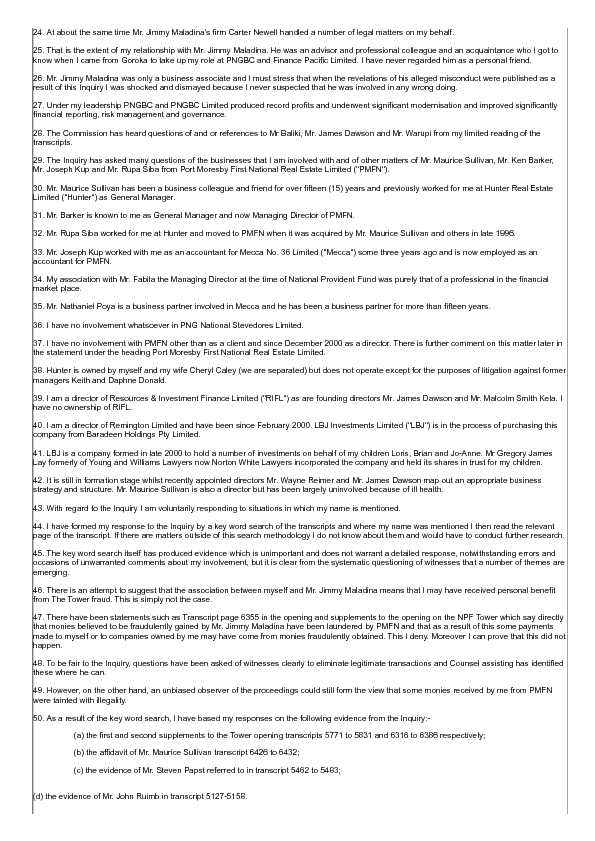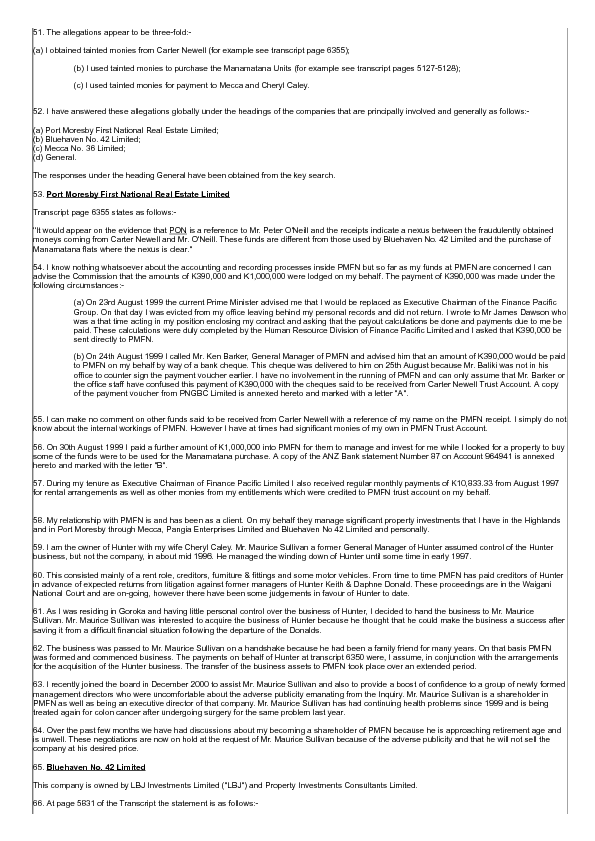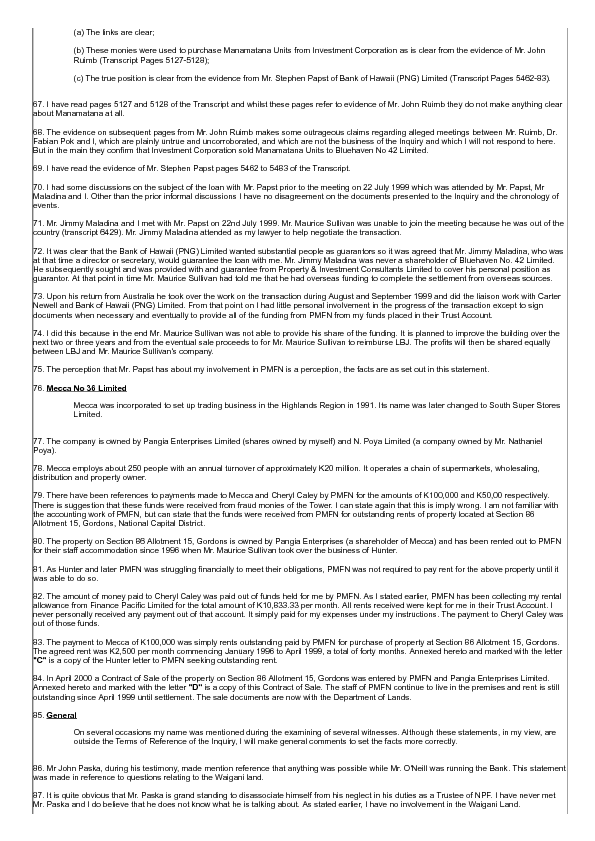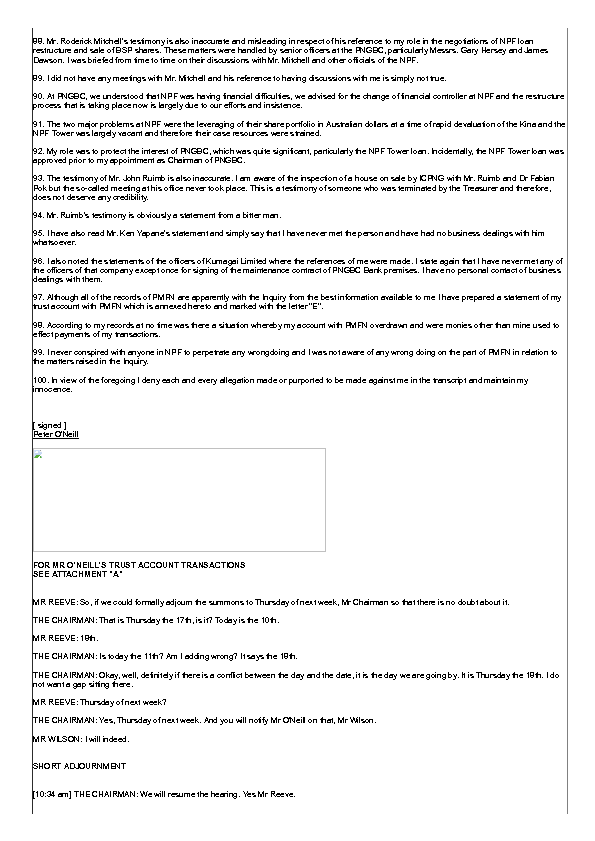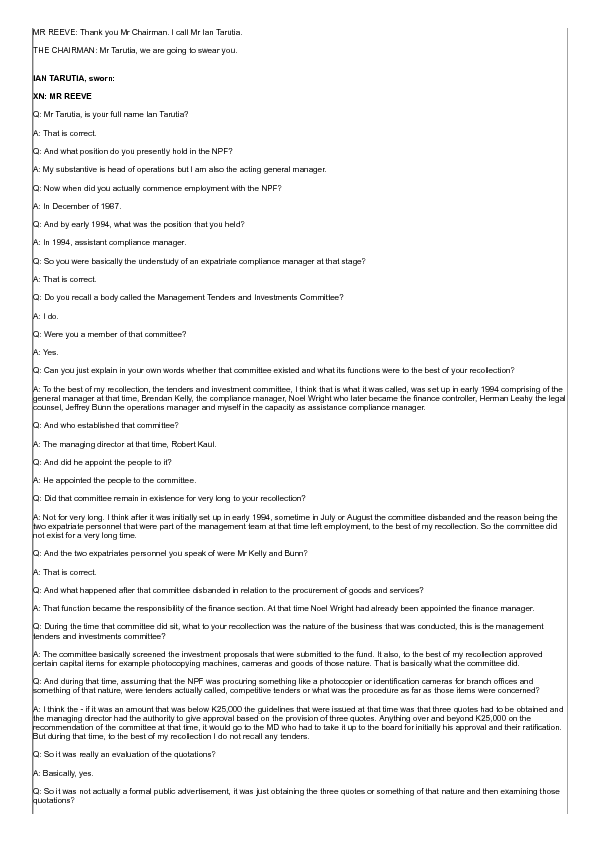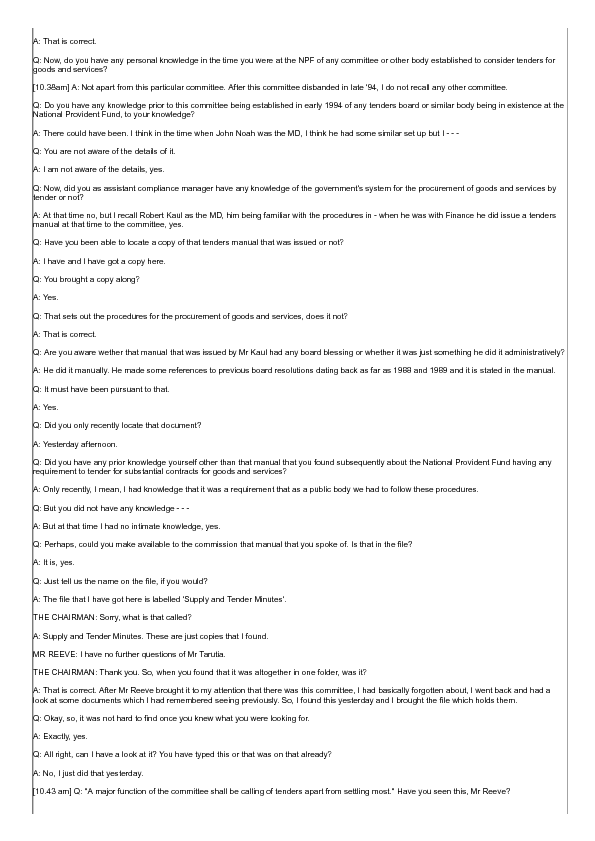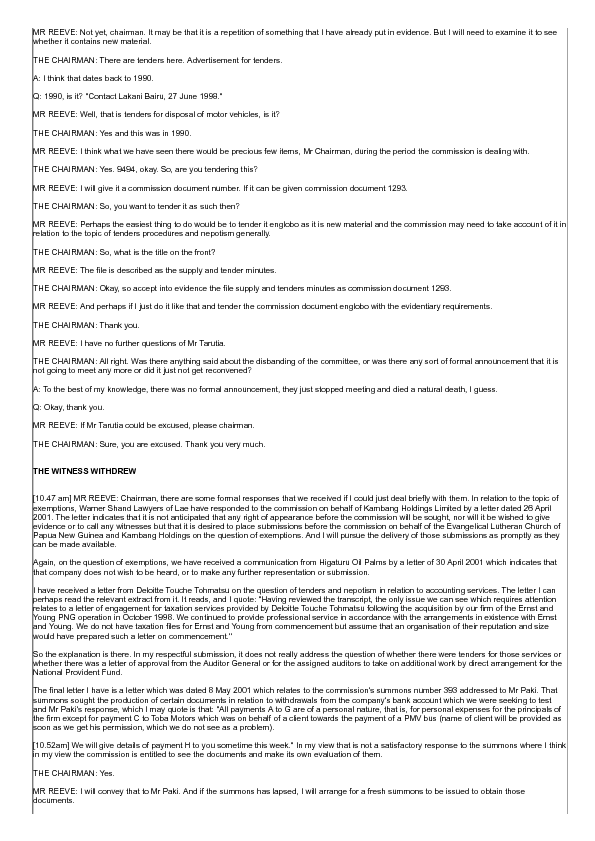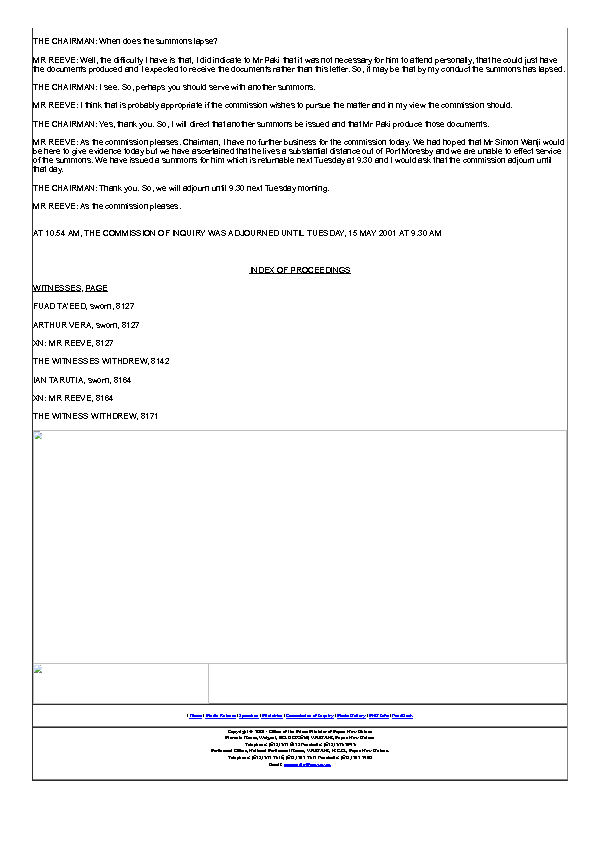Commission of Inquiry into the National Provident Fund – Transcript of Proceedings for 10 May 2001
Mentions of people and company names in this document
It is not suggested or implied that simply because a person, company or other entity is mentioned in the documents in the database that they have broken the law or otherwise acted improperly. Read our full disclaimer
Document content
-
TRANSCRIPT OF PROCEEDINGS
National Judicial Staff Services Supreme Court P O Box 7018 BOROKO. NCD PAPUA NEW GUINEA
Telephone: (675) 324 5792 Facsimile : (675) 325 7732
COMMISSION OF INQUIRY INTO THE NATIONAL PROVIDENT FUND
Mr Tos Barnett, Chairman
Mr Donald Manoa, Commissioner (in absentia) Lady Wilhelmina Siaguru, Commissioner
(in absentia)
AT WAIGANI, THURSDAY 10 MAY 2001 AT 9.34 AM
(Continued from 8 May 2001)
[9.34 am] THE CHAIRMAN: Yes, Mr Reeve.
MR REEVE: Thank you, Mr Chairman. We have some witnesses for the commission this morning and also some formal matters. I will begin with the witnesses first if I may.
THE CHAIRMAN: Yes.
MR REEVE: The first witness I would seek to call is Mr Fuad Fuad Ta’eed Ta’eed, and with him Mr Arthur Vera Vera. Both gentlemen are from Datec. And the evidence that they will be giving concerns the procurement of computer hardware by the National Provident Fund from Datec. So if I may I perhaps if they are both giving evidence we should swear both of them.
THE CHAIRMAN: Yes, okay.
MR REEVE: And then we can proceed with the questions.
THE CHAIRMAN: We will do them together.
FUAD TA’EED, sworn:
ARTHUR VERA, sworn:
XN: MR REEVE
Q: I will address the questions to Mr Ta’eed. If to the extent you answer, Mr Vera, if you could just indicate your name before you start giving the answer otherwise the transcription services cannot work out who is speaking. And when you give your evidence if you could speak into the microphone, otherwise we do not record it.
Now, the question we are concerned with is the procuring of the AS400 system by the National Provident Fund in 1998 and the negotiations that preceded that. Now, prior to Datec giving a quotation to NPF, were there any public tenders to your knowledge?
MR TA’EED: I do not believe that there were any public tenders.
Q: You were just asked to provide a quotation for the supply of the equipment?
MR TA’EED: No, first of all the gentleman who was involved with the NPF is no longer with Datec. We have contacted him and we have basically obtained some information, which we will transfer to yourselves. What I understand, they had an AS400 which was running. It was overutilised. That was the first issue. The second issue was they asked us to work at night to try to develop the software because during the daytime they were running production work. They then came to us and said we have two things. First of all we want these reports to come out quicker, faster. Second we want to recruit our own staff to do the development work. So our advice to them was first we would do a performance analysis, that is we would take the data, information which is collated on activities on the system, send it down to IBM and get them to review it and give a report back, which they did and sent it back and said basically what we knew that this system was too small, they needed to have an upgrade and this amount of space would require this amount of CPU, they would require XYZ. NPF then said okay in that case we would like to purchase a new system and we want to keep the old system to be used as a development and a backup machine in case the first one fails. And that was the status as of January.
Q: January 19?
-
Page 2 of 16
-
MR TA’EED: ’98. Now the process which takes place so that is the background to the tendering in response to your question.
Q: But they were not necessarily committed to another IBM machine. They could have obtained something that was IBM compatible and still achieve the same results or not?
MR TA’EED: No, not for that software. That software only runs on an AS400. The only way to acquire a different machine was to acquire a machine and a different software and convert everything
Q: To the new software system?
MR TA’EED: To the AS400. That is correct.
Q: So that would have defeated the purposes of retaining the old AS400 and the same system?
MR TA’EED: Correct. This is exactly what happened when we moved from the Macintosh system to the AS400. Everything had to be
Q: When did that occur, Mr Ta’eed?
MR TA’EED: The Macintosh?
Q: Yes, the transfer from Macintosh?
MR TA’EED: That would be ’93 I believe. Roughly that time.
Q: Or thereabouts?
MR TA’EED: That is right.
[9:38 am] Q: Now with IBM equipment, is Datec the only authorised distributor of genuine IBM in PNG or are there competitors to you?
MR TA’EED: Datec is the only authorised reseller of IBM equipment in PNG and is the only authorised service centre. The reason why I say that is because there have been attempts by a number of other companies to sell the equipment but to pass on the service to Datec and in the case in one case, they lost that agency. At the present moment, we are the only one on both parts, that is for selling and for servicing.
Q: And was that the position in each of 1993 and 1988?
MR TA’EED: Correct.
Q: Now the importance of the authorised agent status as I understand it is that if one requires maintenance or service work, then you would negative your warranties if you deal with other than an authorised agent. Is that the situation with IBM equipment?
MR TA’EED: The warranty period is generally 12 months. It varies for different prices. For example, a printer is three months but let us say it is 12 months over all. During the warranty period it would negate that if somebody else came to fix the machine. After the warranty period, it really is up to the organisation.
Q: As to their service arrangements?
MR TA’EED: As to their service arrangements, whether they feel they would like to give it to somebody else.
Q: Now can I just take you to Datec’s ownership and the involvement of people. What is the relationship presently if I could put it that way, between Steamships Trading Company and Datec?
MR TA’EED: Steamships Trading Company owns 50 per cent of Datec.
Q: And was that the position in both 1993 and 1998 as well?
MR TA’EED: Correct.
Q: Now, when these negotiations were undertaken, was Mr David Copland the managing director of Steamships Trading Company?
MR TA’EED: In 1993, he was and 1998, to be honest I cannot remember. I do not think so.
THE CHAIRMAN: He was until September, was he not?
MR REEVE: Till September 1998. Sorry, until September 1998, he was a trustee on the NPF Board but he had earlier I think left Steamships.
MR TA’EED: I can to be honest I cannot remember the date.
Q: Did Mr Copland from your observation have any involvement in procuring the services or the hardware if I can put it that way, of and from Datec?
MR TA’EED: Mr Copland never got himself involved in any of the sales activities of Datec but in the case of NPF we got a real as I say an unhappy customer. He rang me personally and said he was unhappy about the delivery of service to NPF and we better pull our socks up so he was not involved in the sale but he certainly was involved when he felt NPF was not getting a good deal.
[9.42 am] Q: You will appreciate why I have to ask you these questions. Now, if we could turn to the supply of the new AS400 which is what I am concerned about. The original quotation which was given was in January 1998 and perhaps I could just show it to you if I may in commission document 1291, a copy of the quotation dated 28 January 1998 from Datec addressed for the attention of Mr Herman Leahy. It shows the total handwritten at K429,500. I do not know whose writing that is.
MR TA’EED: Australian dollars.
Q: Sorry, Australian dollars, I am sorry, not kina. Could you just have a look at that if you would and then tell us whether that is in fact a copy of the original quotation?
MR TA’EED: It is.
-
Page 3 of 16
-
Q: Thank you. Did Datec for the purpose of giving that quotation to the National Provident Fund obtain a quotation from IBM in Australia?
MR TA’EED: Okay, I need to explain to you the process by which quotations are obtained or given to customers with regards to IBM equipment, and strictly this relates to IBM. IBM provides all its resellers and Datec is included in that, a software product. That software product is a configurator. So, let us say this particular microphone was a computer and you came and said we want one of these. We would then go to the software and say we would like to order a microphone. You would then ask us, do you want a microphone for one person or five persons and it would go through a whole list of questions and we answer those questions. At the end of that, it will come out with a configuration listing which is what you see on this quote. We then copy that because it is not in any Word or Excel format. This actually was derived on Excel, take that data and put it into an Excel spreadsheet with their prices which would have been in a heading column and then convert it to what we consider to be our sale price to NPF. So, what you see here is a document derived directly from a configurator. It is not an order on IBM nor has the order been vetted by IBM yet because this process sometimes takes 10 to 15 times. A customer says, no, I did not really want it. I wanted a white microphone, I did not want a black one and it goes through this whole process and it takes anywhere between three to four hours of an expert to sit and drive this configurator unfortunately.
Q: But you would presumably before you gave any quotation to NPF, you would obtain, if I can put it this way, an underlying quotation from IBM?
MR TA’EED: That is what that configurator is. Yes, correct, that is in fact what that configurator does.
Q: Now, I think that was the document we asked you to produce under the summons today.
MR TA’EED: Okay, that document is not available because it would have been taken off the system and just done a copy, paste, and we would have never kept the original.
Q: So, it is in electronic form?
MR TA’EED: That is right. There would have been a software product which you key in the things, copy, paste it and that is the end of the story.
[9.46 am] Q: Well, the matter then proceeds, does it, to it is firming up, if you like, exactly what they want and it arrives at the point where an order is placed?
MR TA’EED: That is correct.
Q: Now, you placed the order with IBM?
MR TA’EED: Correct.
Q: That is the situation?
MR TA’EED: Correct.
Q: I will just show you, if I may, a document from the same commission document which is a facsimile transmission from Mr Vera to IBM Australia. It is marked with a tag numbered 2.
MR TA’EED: It is the other way around. Dated 29 June.
Q: Oh, sorry, it is the other way around; from IBM to Mr Vera and it is dated 29 June. Can you just confirm that that is the underlying quotation received from IBM?
MR TA’EED: That is correct, that is.
Q: Thank you.
MR TA’EED: That matter is actually the order. Okay, yes, that is right. Now, let me, if I may, proceed through what happened. After you have gone through the configurator a number of times, and in this particular time when the January quotation was given, the customer was advised that there was an 8 per cent discount which had been given to them by IBM provided the order was placed before the end of February. In fact we noticed Mr Vera advised them in the minutes that it was within the first week of March but given give or take, their 8 per cent was incorporated in the sales because it was the first quarter of the year and like all suppliers, they would like to make their targets. That time passed. They had in fact a number of other permutations of the configurator, and fortunately we do not have those documents; they may be with NPF. Then around, I believe, end of May, they came to Datec and said they had now got authorisation to purchase. At that point, we then loaded the last configuration which they had agreed to onto IBM, actually within IBM system. They then faxed us the output from that, which is a document you have in front of you, and asked us to sign it. Because once that is signed on our behalf and faxed back to them, manufacturing is told to build that machine.
Q: Right, to the configuration that is being prescribed?
MR TA’EED: That is correct. So you will see that that has got a lot more information than what is on the system coming up because this comes off a PC configurator, that comes off a main frame configurator. So it will go through a lot of details about this is deleted, this is added on XYZ. And once and I believe after Vera signed that document once he had signed that document and faxed it out, that became an official order from Datec, and we did not place that official order until we had received the 10 per cent deposit.
Q: Now, let me just ask you something about that. In the document that we are looking at, there are two prices shown. One is what is called a list price and the other is a discount price.
MR TA’EED: Correct.
Q: Can you just explain to us what the difference between all these prices and a discount price is?
MR TA’EED: This price is the price a man off the street would purchase. A discount price is the price which a reseller buys from IBM.
[9:50 am] Q: And the differential is 25 per cent?
MR TA’EED: I have not actually calculated it. It may very well be correct. It varies between, if you have a new system or you have an upgrade of a system and their case was being an upgrade but generally it is less.
Q: Would you like to just check that that is the way we
MR TA’EED: Mr Vera has confirmed that it is 25 per cent.
-
Page 4 of 16
-
Q: Now following the placement of that order, you then provide a price to NPF?
MR TA’EED: That had already been given to them.
Q: Now I will just show you a document if I may. It does not have a date on it but it is headed NPF AS400 Summary selling price with a total of AUD$483,804. It is tag number 3 in commission document 1291. Perhaps if I could just show you the document and then I just would like to ask you some questions about that. Now when we study that document, what we are trying to look at you see is to explain the difference between the original quoted price and the subsequently quoted price. And it seems to us that that increase consists of two components. Firstly there is an increase of AUD$35,840 in the base price. And secondly, there is a component of $18,500 changing from what is called a CISC
MR TA’EED: To a RISC transition.
Q: To a RISC transition. Now could you just explain what those two components of the increase involve and why the increase applies?
MR TA’EED: Okay, let us take the more technically complex one which is the CISC to RISC transition. The AS400 which NPF bought in 1993 or thereabouts, used the technology which the CISC and for complex instructions, the instructions do multiple things with one command. The RISC instruction is basically a reduced instruction. It does one activity per command. The computer world moved from what they call complex instruction to simpler reduced instructions over 10 to 15 years and the AS400 moved in the same direction. To move from complex to RISC it involves converting the software across to the new type of instruction and there is a transition cost and that is basically what that AUD$18,5000 covered that.
Q: That applies what, to their old machine and the old system?
MR TA’EED: Yes to convert the old software to the new type of hardware and that applied to every single AS400 user in the world. That is they had to go through this conversion process.
Q: And that was necessary because they wanted to retain the old system as a backup?
MR TA’EED: Correct.
Q: And the second increase?
MR TA’EED: The second increase was the increase in which they were entitled to and had been given to them in the January quotation of 8 per cent.
Q: That was the discount?
MR TA’EED: That was the discount which they did not exercise.
Q: So we come into another order. So that discount was no longer available?
MR TA’EED: Correct. They were attempting IBM at that time, not only to give discount but to move people from one operating system environment to a different operating environment and that discount applied also the operating system environment was also part of it.
Q: Now if you just look at the document that I referred you to, this is the summary?
MR TA’EED: Correct.
Q: When I look at that summary, I see these three factors which I would like to have the benefit of your evidence on. We see an exchange rate variance of 2 per cent, a surcharge of 5 per cent and when we come down for gross profit margin we see a gross profit of 36.09 per cent. Now the question that obviously would occur to us is, well look, when we look at the IMB listing, we see that if I was a man off the street, I could have bought that machine from IBM subject to a 25 per cent mark up. When I look at what it cost NPF I see well there are these two inbuilt per centages which add to 7 per cent and there is a mark up of 36 per cent.
[9.54am] So, I say to myself well, why would it not have been cheaper for NPF to just go straight to IBM. And that is really what I would like you to address if you would and explain why that was not possible or why what I am saying is not correct.
MR TA’EED: No, what you are saying is correct. This price applies to an Australian company. Say I began in Australia within a list price, it takes account of duty for Australia, X, Y, Z. And the list price you have there excludes some of the other charges which an Australian company would pay over and above, like for relocation from Sydney to wherever they bought it, all that. I think it is another 3 or 4 per cent, five per cent. I cannot remember what it is. The discount price is the price they will sell to us. If NPF said we would like to buy from you, IBM directly, then they would take charge of the duty, the insurance, the freight themselves, okay. That is the first thing. The second thing is that, they will be responsible also for themselves to actually install the machine and get it up and running. They would also be responsible on their own behalf for the 12 months warranty and holding spare parts and engineers on the ground, Datec would not be involved in any of those activities.
Q: I see. If I could just pursue that. If one looks at the break down, the insurance and the freight are included and the installation training and the warranty is included?
MR TA’EED: Yes.
Q: So, even if we take those things into account, to me so far that does not explain the 36 per cent as against the 25 per cent so if you could just agree that. I am certainly not criticising I am just asking you to explain.
MR TA’EED: I have no concern about the fact that the percentages in Papua New Guinea are higher than Australia or that maybe Australia is higher than the United States. It is the environment in which you live, people’s salaries here, expatriates in this country are significantly higher than in Australia. So, I always tell people when they are very concerned, if they are willing for me to put the margin on a bottle of beer, if they are bought in Australia or up here, they are happy with that then I am happy to go with that because there are significant cost differences in Papua New Guinea over another country and the 25 per cent would not cover it in Papua New Guinea. If it was the case then Datec would be making annually 25 per cent profit for the whole company and since it is a service company, and you can look at our accounts, you will find it is around 5 per cent. So, obviously there must be some a lot of other costs.
Q: So, you need in effect another higher margin to cover your establishment within Papua New Guinea?
MR TA’EED: Correct.
-
Page 5 of 16
-
[9.59 am] Q: Can I just ask one question. Would it have been possible for NPF to negotiate directly with IBM to purchase the equipment, import the equipment and then seek your services in terms of installation and after sale service?
MR TA’EED: IBM’s policy is that it does not sell directly to the customer in Papua New Guinea.
Q: Because that is within your franchise area as it were?
MR TA’EED: Correct. So, they could have asked and we always encourage customers who can feel that our prices are high, high demand in the company to please go through IBM in Australia, check what your price is down there, review it and come back to us if you feel that our prices are high. And so far I am happy to say that we have still managed to sell.
Q: Yes, can I just ask you this. With a sale of, say, an AS400 where your normal margin it would appear is around 36 percent, would you be amenable to negotiating that down if the customer required?
MR TA’EED: I think the important thing to appreciate is that Datec is not selling boxes. It does not sell a can of beans, it is not a merchandise, it is a service company. So, when you price anything you look overall and see what things you have to deliver to the customer, what it is, the expectations, what kind of support infrastructure they have within their organisation and you price things to cover. Some things you gain, some things you lose. At the present moment, for example, we have a contractor currently working in NPF and it amused me when people were asking for copies of a contract because we have been asking NPF management today, please can you sign this contract for this gentleman who has been working in your office, and they still have not signed the contract. But, on this person, I think we are getting 4 or 5 percent and it is not normal in a consultancy to work on that type of margin.
But, we believe they have major problems which they need to address. They have another supplier they would like to bring in in June and we feel quite relaxed about that. We said, okay, we will try to clean up everything to make sure that the next person we can hand over to them quite easily. So, we look at the overall cost of a project. The first in the 1993 project which was the system which was purchased, we lost a lot of money and the reason was because Macintosh who had promised to give them access to their data, gave them the data but did not give them the data dictionary which told them, in fact, how the data was laid out and we lost months and months of productive time trying to get that thing to work. And, if you look through the notes at the time, you will see it was delay after delay because of that very simple problem but we never passed the cost on directly to NPF, we absorbed it.
So, we look at the overall cost of a service and we say, well, in this particular case those basic components which you read due to insurance, that is the same for whether the customer is X, Y, Z, the margin varies up and down. If NPF had come and said, yes, we would like to have another discount, we will say, fine, what is it that you are going to do. One of the things they said they would do was they would hire somebody to do the development work and that meant that the pressure would be off us, they would take on the responsibility. They took on somebody but he did not last very long so the problem came back to us, which is what we expected. So, the price of
Q: But, assuming that it was obviously, it seems from the documents it was Mr Leahy you were dealing with in 1998, if he had come back and said, well, I have got your selling price. I have your letter setting it out. I would like you to cut a little bit of fat out of it. Would you take a lower margin? Would you have entertained such a request at all?
MR TA’EED: A customer has always to be entertained. That is whether you are able to achieve what they require. Sometimes it is difficult. To be honest, I am not sure what would have happened. In some cases I have to take the generality. In some cases we do, given some cases we do not give and the circumstance at the time would have the critical issue and I am not privy to exactly what happened.
Q: Were you aware of any request being made by NPF to try and, if can put it crudely, knock the price down a little?
MR TA’EED: We know that we gave them an 8 percent discount which was given by IBM to us. We passed that on to them and told them it is imperative that you agree to this contract within this time.
[10.03 am] Q: If, for example, they would come back and say, well, look, we will settle with this but you offered us an 8 per cent discount earlier. If you reinstate that discount, we will go with you. Would you have entertained that or would they have entertained that?
MR TA’EED: Again, I do not know about whether IBM would. To be honest, today, if I was looking at it and somebody came to me, I would say to myself, well, I started working on your particular request for an upgrade in mid 1997. We spent time getting at performance state, we sent it down to Australia, we got that, we paid for that, we came back up and gave you the data, you then said that you were going to place the order in that period. We said okay, we will give you an 8 per cent discount. Then the order did not come through. Then finally when it came, it was six months after the first quotation. This is the amount of effort we spent trying to get it to here. No.
Q: What if I said, how about 4 per cent?
MR TA’EED: You certainly can ask for 4 per cent and maybe we should come back and say, how about that, increasing it by 4 per cent.
Q: But there was not any request that you were aware of?
MR TA’EED: Not that I am aware of.
Q: Can I just, if I can, take you to the there is a contract for hardware maintenance with the National Provident Fund. Is that something that is optional to a customer who takes an AS400 system?
MR TA’EED: Absolutely.
Q: How does the provision of a hardware maintenance contract relate to the warranties that are given?
MR TA’EED: The warranty is basically a 12 month period. As I said, there are components which do not fit within that time. Anything which is like a printer head, printers and things of this sort, it is treated differently. Printer heads actually have no warranty on it. Printer mechanisms, three months. So, it varies. But let us say in general, 12 months. And that is inbuilt into the purchase price of a new system. For an upgrade system, the rules are actually slightly different. It is for the bits which you have added on because it does not cover the things which you already have. After the warranty period is over, then you have and if you wish, you can take up the maintenance. And if you wish, you can take the maintenance up for everything, you can take maintenance up for part of it, you can take maintenance up for the components you feel are critical. It is quite common practice for people to say, we do not wish to have the PCs and the maintenance but we want all our printers because they know that fails quite often, or we wish to have this or they can take a permutation, they take everything.
Q: I will just show you a document, if I may, which is a copy of an invoice from Datec to the National Provident Fund in November 1999 for the year 2000 hardware maintenance which the total sum, prior to VAT, is just under K200,000. The question that I ask as a noncomputer literate person is if one is purchasing a system, such as the AS 400, for something in the order of almost AUD$500,000, it seems that K200,000 a year for hardware maintenance is very high. It is something approaching 20 per cent of the basic purchase price. Could you just explain to us what that involves and
-
Page 6 of 16
-
why that sort of service cost is justified and whether it covers the old system as well as the new, I suppose, as well?
MR TA’EED: So, first of all, I have been advised that it is both systems. The second thing you need, I would like to explain, is that IBM in Australia or any supplier in any part of the world when they provide the maintenance, they look at the overall size of the market and the spare usage relative to the base so we are not a normal reseller, like an IBM reseller.
[10.07am] We in essence do all the things IBM do in this country. So, IBM, they resell in Australia, does not hold spare parts, does not hold stock. What it does is, when you are a customer come and say, I want X, they say, fine, they place the order on IBM and comes within the next day, unless it has got to be manufactured in the States or somewhere, in which case, it takes whatever the time period is. If you want a service to be done and you come to the reseller and say, by the way, you sold me this machine, I want you to service and he says, why are you ringing me for, you should ring IBM, they do servicing. And IBM then goes and does the servicing because and it has got its own stock of parts. In the case of Datec, we have to buy spares from IBM and stock them in the country. We have a few million kina worth of spares and everytime a customer comes and says, I want, X, Y or Z, in this particular case, NPF, they were the first people to buy this machine. So, we then have to go and place an order on parts for that particular machine and those parts are then held for one machine in that country until its next customer comes along and says, yes, I want another of those machines and we say, thank God for that because we can now spread the cost of these parts.
Q: Chairman, I have no further questions.
THE CHAIRMAN: All right, thank you.
MR REEVE: I would like to thank Mr Ta’eed and Mr Vera for coming. It certainly clarifies things.
THE CHAIRMAN: Yes, thank you. It is good to hear somebody talking about what they do.
MR TA’EED: Thank you, very much.
MR VERA: Thank you.
MR REEVE: If Mr Ta’eed and Mr Vera can be excused.
THE CHAIRMAN: Yes, you are excused now. Thank you, very much.
THE WITNESSES WITHDREW
[10.12am] THE CHAIRMAN: So, we will take a short break and then we will line up for the next witness.
MR REEVE: Yes, it probably would be a good time to just a very short one.
THE CHAIRMAN: Yes, okay. Adjourn for five minutes.
SHORT ADJOURNMENT
[10.18am] THE CHAIRMAN: Yes, Mr Reeve?
MR REEVE: Mr Chairman, you would recall that last week Mr Peter O’Neill attended before the commission to answer a summons that required the production of certain documents. Mr O’Neill is apparently not in the country and Mr Wilson of Warner Shand is here to represent him. Mr Wilson did foreshadow to us in a fax that was sent to us yesterday that Mr O’Neill would not be here as he is overseas and indicated what steps had been taken to obtain the documents that the commission sought, and asked that the summons be extended until 24 May. And that is really where the difficulty arises because we do not have sufficient time to extend the summons until 24 May.
THE CHAIRMAN: When is he due back in the country, Mr Wilson?
MR WILSON: Mr Chairman, the indication I have is a letter from RIFL signed by Mr Dawson which I received yesterday to say that Mr O’Neill has not returned from overseas and may not be for a week or so. The absence is business related. I will endeavour to have him sign a letter to the Ombudsman Commission by fax if I can track him down. I spoke to Mr Dawson and he said, he had sent that letter that I had copied to you for O’Neill to sign to release the papers from the Ombudsman to him and I expect that letter today, not that I know where Mr O’Neill is.
THE CHAIRMAN: Is it Mr Reeve, done by summons to appear today? We adjourned the summons until today, or did we not?
MR REEVE: Yes, we adjourned the summons until today.
THE CHAIRMAN: He did not indicate he was intending to leave the country at that stage?
MR REEVE: No, I mean, my own private thinking was that, after discussions earlier with Mr Wilson that he would actually be giving evidence today.
THE CHAIRMAN: That is what I thought.
MR WILSON: Mr Chairman, he does say in his evidence that he was wanting to go to Brisbane. Mr Reeve’s question on page 7904 was, “Would Tuesday next week do, you think be long enough?”. Answer “I will probably be in town, but I will be in”, then it goes on and says “I will be in Brisbane, leaving on Friday and I have prior engagements mostly in probably most of next week, I will be out of town.” So, that is what he said. Then Mr Reeve pressed on and said “I think you will be available on Thursday”, that is today, he said “Most probably, yes.”
THE CHAIRMAN: Yes, I remember that now. And then I formally adjourned it until Thursday.
MR WILSON: Yes. Perhaps we could formally adjourn the summons until next Thursday at 9.30, and that is your ruling to do so.
THE CHAIRMAN: Yes.
MR WILSON: I was not there, I received these transcripts yesterday from Mr Dawson and did not realise that my client was bound to be here today, strictly speaking. All I can say is that, he has been open and has requested me to chase up both Finance Pacific Limited and the Ombudsman to obtain the documentation required. So far as the Ombudsman is concerned, they are in fact authorised by myself acting on O’Neill’s behalf to hand
-
Page 7 of 16
-
over the documents but they are now insisting on receiving from me a letter signed by O’Neill to release them from their obligation to under some secrecy provisions in the Organic Law not to reveal documents that have been given without approval.
THE CHAIRMAN: Yes, but we are ready to crossexamine Mr O’Neill. So, how soon can you get him back into the country? I mean as far as I am concerned, he is now in breach.
[10:22 am] MR WILSON: Yes, I can say that these are my assumptions. (1) That today or tomorrow I will be in a position to get his documents from the Ombudsman Commission. In response to the Finance Pacific Limited, a request to get documents which were left there, I spoke to Jonathan Barwick subsequent to his letter that I copied to you and he says that as far as he can see there is nothing there and I want him to put that in writing but I have not yet received a letter from him. So it is probable then that the documents would be available from the Ombudsman and unlikely there will be anything from the Finance Pacific Limited. That is the position. So as far as the indication when he will be returning, Mr Dawson spoke to me and this is the letter and said that he was not running away, he thought he would be back next week which brings him into an ambit of one week. Mr Reeve is saying two weeks is too long. I therefore, adduce my request for an extension of one week to say next Thursday.
THE CHAIRMAN: What are you advising Mr Reeve? What is your view on this?
MR REEVE: I certainly will need the documents before I cross examine Mr O’Neill, the returns from the Ombudsman Commission. As far as the monthly statements from Port Moresby First National Real Estate are concerned, I have some of those in relation to the period between March and December 1999 and I have summoned copies of the rest of them in the summons that is returnable tomorrow. You may recall that Mr O’Neill said that he personally did not have any copies but he believed that they were in the documents that were left at the Papua New Guinea Banking Corporation. So I have sought to deal with that aspect in a separate way by having them produced by the source and I hope they will be produced tomorrow so we do not have great problems as far as that is concerned. The Ombudsman returns, we do need to wait for. I understand the Ombudsman’s insistence on a document signed by Mr O’Neill personally because he has secrecy obligations. We are not really in a position to advance matters until we have those documents available and other documents which we are in the process of summoning. If Mr O’Neill is not here well the circumstances would indicate the common sense course. We need to adjourn for a week and I would have no problems with that and Mr O’Neill can perhaps then explain why he was not here today.
THE CHAIRMAN: Yes thank you Mr Reeve. I just hope he is not joining that happy group that is sitting in Cairns or Brisbane waiting for this commission to finish.
MR WILSON: For what it is worth, I would say that is highly unlikely. He is a different person and much more worthy to this country than you can believe so.
THE CHAIRMAN: And we tend to have a longer life that is generally expected.
MR WILSON: I know as the commission, the only additional thing I could do that might progress things is tender his affidavit which Mr Reeve has a copy of.
MR REEVE: I do not know whether I have a copy or the original. Certainly I could assist Mr Wilson if I could by tendering englobo, commission document 1292 which is a statement of Mr O’Neill signed by him.
[10.26 am] The document itself does not appear to be dated but it was forwarded to us under cover of Mr Wilson’s letter of 27 April 2001.
THE CHAIRMAN: We will at the moment set it into evidence. Commission document 1292, is it?
MR REEVE: 1292.
THE CHAIRMAN: And a number to be allocated as an exhibit number?
MR REEVE: It is commission document 1292. I will tender it englobo.
THE CHAIRMAN: As such, okay, thank you.
MR REEVE: And I also ask for a direction that the body of the statement which is exactly 100 paragraphs in length and the annexure (E) which are typed documents rather than copies of other documents be incorporated in the transcript.
THE CHAIRMAN: And you will give a copy to the transcribers.
MR REEVE: I will make a copy available to the transcription service.
THE CHAIRMAN: All right, I make those orders.
PAPUA NEW GUINEA
COMMISSION OF INQUIRY
INTO
THE NATIONAL PROVIDENT FUND
STATEMENT OF PETER O’NEILL
On the 27th day of April 2001, I Peter O’Neill of PO Box 2 Goroka, Eastern Highlands Province, Company Director, make oath and say as follows:
1. I am an accountant by profession graduating from the University of Papua New Guinea in 1987 with a first class Honour’s Degree in Accounting. I attended the Goroka High School graduating from there in 1982.
2. I am an Associate member of the Papua New Guinea Institute of Accountants and former President of that Institute. I am also a Registered Public Accountant and Auditor with the Accountants Registration Board of Papua New Guinea.
3. I was born at Pangia in the Southern Highlands Province but lived most of my life in Goroka, Eastern Highlands Province where I have a home and continue to reside. I also have a property in Port Moresby where I live when I am in town on business. I am married with three children aged 9, 7 and 2 years respectively.
-
Page 8 of 16
-
4. In 1988 I commenced work with Maurice Pratley & Associates as an accountant and later as partner.
5. In 1991 I left that practice in 1991 to set up a trading business in Goroka, Eastern Highlands Province.
6. In 1994 I was appointed Deputy Chairman of the Papua New Guinea Harbours Board.
7. In August 1997, I was appointed as Executive Chairman of Papua New Guinea Banking Corporation (“PNGBC”) and I resided in Port Moresby for the sake of the position which I held until August 1999.
8. The PNGBC and later Finance Pacific Limited position was challenging and marked by an increasing pace of change.
9. In December 1997 the government of the day legislated to corporatise the Rural Development Bank (“RDB”), Niugini Insurance (“NI”) and Motor Vehicles Insurance Trust (“MVIT”) and to pass ownership of these entities to PNGBC.
10. As a consequence of this legislative action I became Executive Chairman of each RDB, NI and MVIT. At this point in time the subsidiaries of PNGBC had been corporatised by the PNGBC itself was still a government trading entity.
11. Prior to my appointment as Executive Chairman of PNGBC the Bank of its own volition had done significant work and made proposals to government to form a Bank Assurance operation along the lines of Suncorp Metway Bank Limited in Australia which was and continues to be very successful. This was a precursor to plans to corporatise and then privatise PNGBC.
12. In December 1999, the Banking Corporatisation Act was passed by Parliament which required the PNGBC to be corporatised by 31st December 1999. This was completed by my staff, in conjunction with professional advisors and the Board.
13. On 1st January 2000 the Finance Pacific Group was formed with Finance Pacific Limited as the holding company on behalf of the State and all other companies becoming operating subsidiaries of Finance Pacific Limited. This company was by far the largest financial institution in Papua New Guinea and I remained Executive Chairman of the same until I was replaced by Mr. Rimbink Pato on 23rd August 1999.
14. The management structure of Finance Pacific Limited was formed into divisions in about November 1999 with some PNGBC officers joining the Group and others remaining in the Banking stream.
15. The primary focus of these divisions was:
(a) To form logical banking operating groups and to work through duplication issues; and
(b) To form a credible investment and funds management arm to improve the performance of the various investment projects and portfolios within the Group; and
(c) To integrate the back offices in human resources, accounting and financial reporting, public relations, marketing, information services and information technology, projects premises and logistics, and secretarial and compliance matters; and
16. The effect of these arrangements was that Group General Managers were appointed as follows:
(a) Mr. Aho Baliki Group General Manager Banking who was also a director of Finance Pacific Limited and many banking subsidiary companies. This included PNGBC Ltd. which trades as Papua New Guinea Banking Corporation, Nambawan Finance Limited, RDB Limited which operates as Rural Development Bank, and Village Finance Limited.
(b) Mr. James Dawson Group General Manager Services.
(c) Mr. Tony Taylor as Chief Financial Officer for all Group activities (appointed after November 1999).
(d) Mr Adrian Warupi Group General Manager Investments who was also a director of Finance Pacific Limited and many subsidiary investment company and insurance company boards like Motor Vehicles Insurance Limited, Motor Vehicles Registry Services Limited among many.
(e) Mr. Gerald Venables General Manager Insurance who managed Motor Vehicles Insurance Limited and as a director of Pacific MMI Insurance Limited, Pacific Re Limited (appointed after November 1999).
(f) Mr. Wayne Reimer Head of Group Human Resources.
(g) Mr. Jonathan Barwick Group Corporate Secretary (appointed after November 1999).
17. The Group General Managers formed a Group Executive Committee with sufficient authority to run the Group under myself as Group Executive Chairman.
18. In this role I was regarded externally as the Chief Executive of all group companies of Finance Pacific Group.
19. However many matters whilst addressed to me were handled by a competent executive team and most correspondence addressed to me was directed to them as my role was to focus on integration issues, the direction of the Group as a whole and privatisation.
20. Mr Jimmy Maladina was the younger brother of members of the Maladina family with whom I attended the University of Papua New Guinea. I did not have any common background or know him personally until he was introduced to me as an employee of Carter Newell Lawyers by Mr. Peter Pena in 1994.
21. I later became acquainted with Mr. Jimmy Maladina as the Managing Partner of Carter Newell Lawyers when Mr. John Beattie of that firm had the carriage of the corporatisation work on behalf of the Finance Pacific Group.
22. Gadens Lawyers, PriceWaterhouseCoopers and Deloitte Touche Tohmatsu had significant involvement in this process as well, in association with a team led by Mr. James Dawson from Finance Pacific Limited.
23. Significant advice on these matters was also provided by HTM Wilson Corporate Services Limited on divisional structure and divisional management issues.
-
Page 9 of 16
-
24. At about the same time Mr. Jimmy Maladina’s firm Carter Newell handled a number of legal matters on my behalf.
25. That is the extent of my relationship with Mr. Jimmy Maladina. He was an advisor and professional colleague and an acquaintance who I got to know when I came from Goroka to take up my role at PNGBC and Finance Pacific Limited. I have never regarded him as a personal friend.
26. Mr. Jimmy Maladina was only a business associate and I must stress that when the revelations of his alleged misconduct were published as a result of this Inquiry I was shocked and dismayed because I never suspected that he was involved in any wrong doing.
27. Under my leadership PNGBC and PNGBC Limited produced record profits and underwent significant modernisation and improved significantly financial reporting, risk management and governance.
28. The Commission has heard questions of and or references to Mr Baliki, Mr. James Dawson and Mr. Warupi from my limited reading of the transcripts.
29. The Inquiry has asked many questions of the businesses that I am involved with and of other matters of Mr. Maurice Sullivan, Mr. Ken Barker, Mr. Joseph Kup and Mr. Rupa Siba from Port Moresby First National Real Estate Limited (“PMFN”).
30. Mr. Maurice Sullivan has been a business colleague and friend for over fifteen (15) years and previously worked for me at Hunter Real Estate Limited (“Hunter”) as General Manager.
31. Mr. Barker is known to me as General Manager and now Managing Director of PMFN.
32. Mr. Rupa Siba worked for me at Hunter and moved to PMFN when it was acquired by Mr. Maurice Sullivan and others in late 1996.
33. Mr. Joseph Kup worked with me as an accountant for Mecca No. 36 Limited (“Mecca”) some three years ago and is now employed as an accountant for PMFN.
34. My association with Mr. Fabila the Managing Director at the time of National Provident Fund was purely that of a professional in the financial market place.
35. Mr. Nathaniel Poya is a business partner involved in Mecca and he has been a business partner for more than fifteen years.
36. I have no involvement whatsoever in PNG National Stevedores Limited.
37. I have no involvement with PMFN other than as a client and since December 2000 as a director. There is further comment on this matter later in the statement under the heading Port Moresby First National Real Estate Limited.
38. Hunter is owned by myself and my wife Cheryl Caley (we are separated) but does not operate except for the purposes of litigation against former managers Keith and Daphne Donald.
39. I am a director of Resources & Investment Finance Limited (“RIFL”) as are founding directors Mr. James Dawson and Mr. Malcolm Smith Kela. I have no ownership of RIFL.
40. I am a director of Remington Limited and have been since February 2000. LBJ Investments Limited (“LBJ”) is in the process of purchasing this company from Baradeen Holdings Pty Limited.
41. LBJ is a company formed in late 2000 to hold a number of investments on behalf of my children Loris, Brian and JoAnne. Mr Gregory James Lay formerly of Young and Williams Lawyers now Norton White Lawyers incorporated the company and held its shares in trust for my children.
42. It is still in formation stage whilst recently appointed directors Mr. Wayne Reimer and Mr. James Dawson map out an appropriate business strategy and structure. Mr. Maurice Sullivan is also a director but has been largely uninvolved because of ill health.
43. With regard to the Inquiry I am voluntarily responding to situations in which my name is mentioned.
44. I have formed my response to the Inquiry by a key word search of the transcripts and where my name was mentioned I then read the relevant page of the transcript. If there are matters outside of this search methodology I do not know about them and would have to conduct further research.
45. The key word search itself has produced evidence which is unimportant and does not warrant a detailed response, notwithstanding errors and occasions of unwarranted comments about my involvement, but it is clear from the systematic questioning of witnesses that a number of themes are emerging.
46. There is an attempt to suggest that the association between myself and Mr. Jimmy Maladina means that I may have received personal benefit from The Tower fraud. This is simply not the case.
47. There have been statements such as Transcript page 6355 in the opening and supplements to the opening on the NPF Tower which say directly that monies believed to be fraudulently gained by Mr. Jimmy Maladina have been laundered by PMFN and that as a result of this some payments made to myself or to companies owned by me may have come from monies fraudulently obtained. This I deny. Moreover I can prove that this did not happen.
48. To be fair to the Inquiry, questions have been asked of witnesses clearly to eliminate legitimate transactions and Counsel assisting has identified these where he can.
49. However, on the other hand, an unbiased observer of the proceedings could still form the view that some monies received by me from PMFN were tainted with illegality.
50. As a result of the key word search, I have based my responses on the following evidence from the Inquiry:
(a) the first and second supplements to the Tower opening transcripts 5771 to 5831 and 6316 to 6386 respectively;
(b) the affidavit of Mr. Maurice Sullivan transcript 6426 to 6432;
(c) the evidence of Mr. Steven Papst referred to in transcript 5462 to 5483;
(d) the evidence of Mr. John Ruimb in transcript 51275158.
-
Page 10 of 16
-
51. The allegations appear to be threefold:
(a) I obtained tainted monies from Carter Newell (for example see transcript page 6355);
(b) I used tainted monies to purchase the Manamatana Units (for example see transcript pages 51275128);
(c) I used tainted monies for payment to Mecca and Cheryl Caley.
52. I have answered these allegations globally under the headings of the companies that are principally involved and generally as follows:
(a) Port Moresby First National Real Estate Limited; (b) Bluehaven No. 42 Limited; (c) Mecca No. 36 Limited; (d) General.
The responses under the heading General have been obtained from the key search.
53. Port Moresby First National Real Estate Limited
Transcript page 6355 states as follows:
“It would appear on the evidence that PON is a reference to Mr. Peter O’Neill and the receipts indicate a nexus between the fraudulently obtained moneys coming from Carter Newell and Mr. O’Neill. These funds are different from those used by Bluehaven No. 42 Limited and the purchase of Manamatana flats where the nexus is clear.”
54. I know nothing whatsoever about the accounting and recording processes inside PMFN but so far as my funds at PMFN are concerned I can advise the Commission that the amounts of K390,000 and K1,000,000 were lodged on my behalf. The payment of K390,000 was made under the following circumstances:
(a) On 23rd August 1999 the current Prime Minister advised me that I would be replaced as Executive Chairman of the Finance Pacific Group. On that day I was evicted from my office leaving behind my personal records and did not return. I wrote to Mr James Dawson who was a that time acting in my position enclosing my contract and asking that the payout calculations be done and payments due to me be paid. These calculations were duly completed by the Human Resource Division of Finance Pacific Limited and I asked that K390,000 be sent directly to PMFN.
(b) On 24th August 1999 I called Mr. Ken Barker, General Manager of PMFN and advised him that an amount of K390,000 would be paid to PMFN on my behalf by way of a bank cheque. This cheque was delivered to him on 25th August because Mr. Baliki was not in his office to counter sign the payment voucher earlier. I have no involvement in the running of PMFN and can only assume that Mr. Barker or the office staff have confused this payment of K390,000 with the cheques said to be received from Carter Newell Trust Account. A copy of the payment voucher from PNGBC Limited is annexed hereto and marked with a letter “A”.
55. I can make no comment on other funds said to be received from Carter Newell with a reference of my name on the PMFN receipt. I simply do not know about the internal workings of PMFN. However I have at times had significant monies of my own in PMFN Trust Account.
56. On 30th August 1999 I paid a further amount of K1,000,000 into PMFN for them to manage and invest for me while I looked for a property to buy some of the funds were to be used for the Manamatana purchase. A copy of the ANZ Bank statement Number 87 on Account 964941 is annexed hereto and marked with the letter “B”.
57. During my tenure as Executive Chairman of Finance Pacific Limited I also received regular monthly payments of K10,833.33 from August 1997 for rental arrangements as well as other monies from my entitlements which were credited to PMFN trust account on my behalf.
58. My relationship with PMFN is and has been as a client. On my behalf they manage significant property investments that I have in the Highlands and in Port Moresby through Mecca, Pangia Enterprises Limited and Bluehaven No 42 Limited and personally.
59. I am the owner of Hunter with my wife Cheryl Caley. Mr. Maurice Sullivan a former General Manager of Hunter assumed control of the Hunter business, but not the company, in about mid 1996. He managed the winding down of Hunter until some time in early 1997.
60. This consisted mainly of a rent role, creditors, furniture & fittings and some motor vehicles. From time to time PMFN has paid creditors of Hunter in advance of expected returns from litigation against former managers of Hunter Keith & Daphne Donald. These proceedings are in the Waigani National Court and are ongoing, however there have been some judgements in favour of Hunter to date.
61. As I was residing in Goroka and having little personal control over the business of Hunter, I decided to hand the business to Mr. Maurice Sullivan. Mr. Maurice Sullivan was interested to acquire the business of Hunter because he thought that he could make the business a success after saving it from a difficult financial situation following the departure of the Donalds.
62. The business was passed to Mr. Maurice Sullivan on a handshake because he had been a family friend for many years. On that basis PMFN was formed and commenced business. The payments on behalf of Hunter at transcript 6350 were, I assume, in conjunction with the arrangements for the acquisition of the Hunter business. The transfer of the business assets to PMFN took place over an extended period.
63. I recently joined the board in December 2000 to assist Mr. Maurice Sullivan and also to provide a boost of confidence to a group of newly formed management directors who were uncomfortable about the adverse publicity emanating from the Inquiry. Mr. Maurice Sullivan is a shareholder in PMFN as well as being an executive director of that company. Mr. Maurice Sullivan has had continuing health problems since 1999 and is being treated again for colon cancer after undergoing surgery for the same problem last year.
64. Over the past few months we have had discussions about my becoming a shareholder of PMFN because he is approaching retirement age and is unwell. These negotiations are now on hold at the request of Mr. Maurice Sullivan because of the adverse publicity and that he will not sell the company at his desired price.
65. Bluehaven No. 42 Limited
This company is owned by LBJ Investments Limited (“LBJ”) and Property Investments Consultants Limited.
66. At page 5831 of the Transcript the statement is as follows:
-
Page 11 of 16
-
(a) The links are clear;
(b) These monies were used to purchase Manamatana Units from Investment Corporation as is clear from the evidence of Mr. John Ruimb (Transcript Pages 51275128);
(c) The true position is clear from the evidence from Mr. Stephen Papst of Bank of Hawaii (PNG) Limited (Transcript Pages 546283).
67. I have read pages 5127 and 5128 of the Transcript and whilst these pages refer to evidence of Mr. John Ruimb they do not make anything clear about Manamatana at all.
68. The evidence on subsequent pages from Mr. John Ruimb makes some outrageous claims regarding alleged meetings between Mr. Ruimb, Dr. Fabian Pok and I, which are plainly untrue and uncorroborated, and which are not the business of the Inquiry and which I will not respond to here. But in the main they confirm that Investment Corporation sold Manamatana Units to Bluehaven No 42 Limited.
69. I have read the evidence of Mr. Stephen Papst pages 5462 to 5483 of the Transcript.
70. I had some discussions on the subject of the loan with Mr. Papst prior to the meeting on 22 July 1999 which was attended by Mr. Papst, Mr Maladina and I. Other than the prior informal discussions I have no disagreement on the documents presented to the Inquiry and the chronology of events.
71. Mr. Jimmy Maladina and I met with Mr. Papst on 22nd July 1999. Mr. Maurice Sullivan was unable to join the meeting because he was out of the country (transcript 6429). Mr. Jimmy Maladina attended as my lawyer to help negotiate the transaction.
72. It was clear that the Bank of Hawaii (PNG) Limited wanted substantial people as guarantors so it was agreed that Mr. Jimmy Maladina, who was at that time a director or secretary, would guarantee the loan with me. Mr. Jimmy Maladina was never a shareholder of Bluehaven No. 42 Limited. He subsequently sought and was provided with and guarantee from Property & Investment Consultants Limited to cover his personal position as guarantor. At that point in time Mr. Maurice Sullivan had told me that he had overseas funding to complete the settlement from overseas sources.
73. Upon his return from Australia he took over the work on the transaction during August and September 1999 and did the liaison work with Carter Newell and Bank of Hawaii (PNG) Limited. From that point on I had little personal involvement in the progress of the transaction except to sign documents when necessary and eventually to provide all of the funding from PMFN from my funds placed in their Trust Account.
74. I did this because in the end Mr. Maurice Sullivan was not able to provide his share of the funding. It is planned to improve the building over the next two or three years and from the eventual sale proceeds to for Mr. Maurice Sullivan to reimburse LBJ. The profits will then be shared equally between LBJ and Mr. Maurice Sullivan’s company.
75. The perception that Mr. Papst has about my involvement in PMFN is a perception, the facts are as set out in this statement.
76. Mecca No 36 Limited
Mecca was incorporated to set up trading business in the Highlands Region in 1991. Its name was later changed to South Super Stores Limited.
77. The company is owned by Pangia Enterprises Limited (shares owned by myself) and N. Poya Limited (a company owned by Mr. Nathaniel Poya).
78. Mecca employs about 250 people with an annual turnover of approximately K20 million. It operates a chain of supermarkets, wholesaling, distribution and property owner.
79. There have been references to payments made to Mecca and Cheryl Caley by PMFN for the amounts of K100,000 and K50,00 respectively. There is suggestion that these funds were received from fraud monies of the Tower. I can state again that this is imply wrong. I am not familiar with the accounting work of PMFN, but can state that the funds were received from PMFN for outstanding rents of property located at Section 86 Allotment 15, Gordons, National Capital District.
80. The property on Section 86 Allotment 15, Gordons is owned by Pangia Enterprises (a shareholder of Mecca) and has been rented out to PMFN for their staff accommodation since 1996 when Mr. Maurice Sullivan took over the business of Hunter.
81. As Hunter and later PMFN was struggling financially to meet their obligations, PMFN was not required to pay rent for the above property until it was able to do so.
82. The amount of money paid to Cheryl Caley was paid out of funds held for me by PMFN. As I stated earlier, PMFN has been collecting my rental allowance from Finance Pacific Limited for the total amount of K10,833.33 per month. All rents received were kept for me in their Trust Account. I never personally received any payment out of that account. It simply paid for my expenses under my instructions. The payment to Cheryl Caley was out of those funds.
83. The payment to Mecca of K100,000 was simply rents outstanding paid by PMFN for purchase of property at Section 86 Allotment 15, Gordons. The agreed rent was K2,500 per month commencing January 1996 to April 1999, a total of forty months. Annexed hereto and marked with the letter “C” is a copy of the Hunter letter to PMFN seeking outstanding rent.
84. In April 2000 a Contract of Sale of the property on Section 86 Allotment 15, Gordons was entered by PMFN and Pangia Enterprises Limited. Annexed hereto and marked with the letter “D” is a copy of this Contract of Sale. The staff of PMFN continue to live in the premises and rent is still outstanding since April 1999 until settlement. The sale documents are now with the Department of Lands.
85. General
On several occasions my name was mentioned during the examining of several witnesses. Although these statements, in my view, are outside the Terms of Reference of the Inquiry, I will make general comments to set the facts more correctly.
86. Mr John Paska, during his testimony, made mention reference that anything was possible while Mr. O’Neill was running the Bank. This statement was made in reference to questions relating to the Waigani land.
87. It is quite obvious that Mr. Paska is grand standing to disassociate himself from his neglect in his duties as a Trustee of NPF. I have never met Mr. Paska and I do believe that he does not know what he is talking about. As stated earlier, I have no involvement in the Waigani Land.
-
Page 12 of 16
-
88. Mr. Roderick Mitchell’s testimony is also inaccurate and misleading in respect of his reference to my role in the negotiations of NPF loan restructure and sale of BSP shares. These matters were handled by senior officers at the PNGBC, particularly Messrs. Gary Hersey and James Dawson. I was briefed from time to time on their discussions with Mr. Mitchell and other officials of the NPF.
89. I did not have any meetings with Mr. Mitchell and his reference to having discussions with me is simply not true.
90. At PNGBC, we understood that NPF was having financial difficulties, we advised for the change of financial controller at NPF and the restructure process that is taking place now is largely due to our efforts and insistence.
91. The two major problems at NPF were the leveraging of their share portfolio in Australian dollars at a time of rapid devaluation of the Kina and the NPF Tower was largely vacant and therefore their case resources were strained.
92. My role was to protect the interest of PNGBC, which was quite significant, particularly the NPF Tower loan. Incidentally, the NPF Tower loan was approved prior to my appointment as Chairman of PNGBC.
93. The testimony of Mr. John Ruimb is also inaccurate. I am aware of the inspection of a house on sale by ICPNG with Mr. Ruimb and Dr Fabian Pok but the socalled meeting at his office never took place. This is a testimony of someone who was terminated by the Treasurer and therefore, does not deserve any credibility.
94. Mr. Ruimb’s testimony is obviously a statement from a bitter man.
95. I have also read Mr. Ken Yapane’s statement and simply say that I have never met the person and have had no business dealings with him whatsoever.
96. I also noted the statements of the officers of Kumagai Limited where the references of me were made. I state again that I have never met any of the officers of that company except once for signing of the maintenance contract of PNGBC Bank premises. I have no personal contact of business dealings with them.
97. Although all of the records of PMFN are apparently with the Inquiry from the best information available to me I have prepared a statement of my trust account with PMFN which is annexed hereto and marked with the letter “E”.
98. According to my records at no time was there a situation whereby my account with PMFN overdrawn and were monies other than mine used to effect payments of my transactions.
99. I never conspired with anyone in NPF to perpetrate any wrongdoing and I was not aware of any wrong doing on the part of PMFN in relation to the matters raised in the Inquiry.
100. In view of the foregoing I deny each and every allegation made or purported to be made against me in the transcript and maintain my innocence.
[ signed ] Peter O’Neill
FOR MR O’NEILL’S TRUST ACCOUNT TRANSACTIONS SEE ATTACHMENT “A”
MR REEVE: So, if we could formally adjourn the summons to Thursday of next week, Mr Chairman so that there is no doubt about it.
THE CHAIRMAN: That is Thursday the 17th, is it? Today is the 10th.
MR REEVE: 18th.
THE CHAIRMAN: Is today the 11th? Am I adding wrong? It says the 18th.
THE CHAIRMAN: Okay, well, definitely if there is a conflict between the day and the date, it is the day we are going by. It is Thursday the 18th. I do not want a gap sitting there.
MR REEVE: Thursday of next week?
THE CHAIRMAN: Yes, Thursday of next week. And you will notify Mr O’Neill on that, Mr Wilson.
MR WILSON: I will indeed.
SHORT ADJOURNMENT
[10:34 am] THE CHAIRMAN: We will resume the hearing. Yes Mr Reeve.
-
Page 13 of 16
-
MR REEVE: Thank you Mr Chairman. I call Mr Ian Tarutia.
THE CHAIRMAN: Mr Tarutia, we are going to swear you.
IAN TARUTIA, sworn:
XN: MR REEVE
Q: Mr Tarutia, is your full name Ian Tarutia?
A: That is correct.
Q: And what position do you presently hold in the NPF?
A: My substantive is head of operations but I am also the acting general manager.
Q: Now when did you actually commence employment with the NPF?
A: In December of 1987.
Q: And by early 1994, what was the position that you held?
A: In 1994, assistant compliance manager.
Q: So you were basically the understudy of an expatriate compliance manager at that stage?
A: That is correct.
Q: Do you recall a body called the Management Tenders and Investments Committee?
A: I do.
Q: Were you a member of that committee?
A: Yes.
Q: Can you just explain in your own words whether that committee existed and what its functions were to the best of your recollection?
A: To the best of my recollection, the tenders and investment committee, I think that is what it was called, was set up in early 1994 comprising of the general manager at that time, Brendan Kelly, the compliance manager, Noel Wright who later became the finance controller, Herman Leahy the legal counsel, Jeffrey Bunn the operations manager and myself in the capacity as assistance compliance manager.
Q: And who established that committee?
A: The managing director at that time, Robert Kaul.
Q: And did he appoint the people to it?
A: He appointed the people to the committee.
Q: Did that committee remain in existence for very long to your recollection?
A: Not for very long. I think after it was initially set up in early 1994, sometime in July or August the committee disbanded and the reason being the two expatriate personnel that were part of the management team at that time left employment, to the best of my recollection. So the committee did not exist for a very long time.
Q: And the two expatriates personnel you speak of were Mr Kelly and Bunn?
A: That is correct.
Q: And what happened after that committee disbanded in relation to the procurement of goods and services?
A: That function became the responsibility of the finance section. At that time Noel Wright had already been appointed the finance manager.
Q: During the time that committee did sit, what to your recollection was the nature of the business that was conducted, this is the management tenders and investments committee?
A: The committee basically screened the investment proposals that were submitted to the fund. It also, to the best of my recollection approved certain capital items for example photocopying machines, cameras and goods of those nature. That is basically what the committee did.
Q: And during that time, assuming that the NPF was procuring something like a photocopier or identification cameras for branch offices and something of that nature, were tenders actually called, competitive tenders or what was the procedure as far as those items were concerned?
A: I think the if it was an amount that was below K25,000 the guidelines that were issued at that time was that three quotes had to be obtained and the managing director had the authority to give approval based on the provision of three quotes. Anything over and beyond K25,000 on the recommendation of the committee at that time, it would go to the MD who had to take it up to the board for initially his approval and their ratification. But during that time, to the best of my recollection I do not recall any tenders.
Q: So it was really an evaluation of the quotations?
A: Basically, yes.
Q: So it was not actually a formal public advertisement, it was just obtaining the three quotes or something of that nature and then examining those quotations?
-
Page 14 of 16
-
A: That is correct.
Q: Now, do you have any personal knowledge in the time you were at the NPF of any committee or other body established to consider tenders for goods and services?
[10.38am] A: Not apart from this particular committee. After this committee disbanded in late ’94, I do not recall any other committee.
Q: Do you have any knowledge prior to this committee being established in early 1994 of any tenders board or similar body being in existence at the National Provident Fund, to your knowledge?
A: There could have been. I think in the time when John Noah was the MD, I think he had some similar set up but I
Q: You are not aware of the details of it.
A: I am not aware of the details, yes.
Q: Now, did you as assistant compliance manager have any knowledge of the government’s system for the procurement of goods and services by tender or not?
A: At that time no, but I recall Robert Kaul as the MD, him being familiar with the procedures in when he was with Finance he did issue a tenders manual at that time to the committee, yes.
Q: Have you been able to locate a copy of that tenders manual that was issued or not?
A: I have and I have got a copy here.
Q: You brought a copy along?
A: Yes.
Q: That sets out the procedures for the procurement of goods and services, does it not?
A: That is correct.
Q: Are you aware wether that manual that was issued by Mr Kaul had any board blessing or whether it was just something he did it administratively?
A: He did it manually. He made some references to previous board resolutions dating back as far as 1988 and 1989 and it is stated in the manual.
Q: It must have been pursuant to that.
A: Yes.
Q: Did you only recently locate that document?
A: Yesterday afternoon.
Q: Did you have any prior knowledge yourself other than that manual that you found subsequently about the National Provident Fund having any requirement to tender for substantial contracts for goods and services?
A: Only recently, I mean, I had knowledge that it was a requirement that as a public body we had to follow these procedures.
Q: But you did not have any knowledge
A: But at that time I had no intimate knowledge, yes.
Q: Perhaps, could you make available to the commission that manual that you spoke of. Is that in the file?
A: It is, yes.
Q: Just tell us the name on the file, if you would?
A: The file that I have got here is labelled ‘Supply and Tender Minutes’.
THE CHAIRMAN: Sorry, what is that called?
A: Supply and Tender Minutes. These are just copies that I found.
MR REEVE: I have no further questions of Mr Tarutia.
THE CHAIRMAN: Thank you. So, when you found that it was altogether in one folder, was it?
A: That is correct. After Mr Reeve brought it to my attention that there was this committee, I had basically forgotten about, I went back and had a look at some documents which I had remembered seeing previously. So, I found this yesterday and I brought the file which holds them.
Q: Okay, so, it was not hard to find once you knew what you were looking for.
A: Exactly, yes.
Q: All right, can I have a look at it? You have typed this or that was on that already?
A: No, I just did that yesterday.
[10.43 am] Q: “A major function of the committee shall be calling of tenders apart from settling most.” Have you seen this, Mr Reeve?
-
Page 15 of 16
-
MR REEVE: Not yet, chairman. It may be that it is a repetition of something that I have already put in evidence. But I will need to examine it to see whether it contains new material.
THE CHAIRMAN: There are tenders here. Advertisement for tenders.
A: I think that dates back to 1990.
Q: 1990, is it? “Contact Lakani Bairu, 27 June 1998.”
MR REEVE: Well, that is tenders for disposal of motor vehicles, is it?
THE CHAIRMAN: Yes and this was in 1990.
MR REEVE: I think what we have seen there would be precious few items, Mr Chairman, during the period the commission is dealing with.
THE CHAIRMAN: Yes. 9494, okay. So, are you tendering this?
MR REEVE: I will give it a commission document number. If it can be given commission document 1293.
THE CHAIRMAN: So, you want to tender it as such then?
MR REEVE: Perhaps the easiest thing to do would be to tender it englobo as it is new material and the commission may need to take account of it in relation to the topic of tenders procedures and nepotism generally.
THE CHAIRMAN: So, what is the title on the front?
MR REEVE: The file is described as the supply and tender minutes.
THE CHAIRMAN: Okay, so accept into evidence the file supply and tenders minutes as commission document 1293.
MR REEVE: And perhaps if I just do it like that and tender the commission document englobo with the evidentiary requirements.
THE CHAIRMAN: Thank you.
MR REEVE: I have no further questions of Mr Tarutia.
THE CHAIRMAN: All right. Was there anything said about the disbanding of the committee, or was there any sort of formal announcement that it is not going to meet any more or did it just not get reconvened?
A: To the best of my knowledge, there was no formal announcement, they just stopped meeting and died a natural death, I guess.
Q: Okay, thank you.
MR REEVE: If Mr Tarutia could be excused, please chairman.
THE CHAIRMAN: Sure, you are excused. Thank you very much.
THE WITNESS WITHDREW
[10.47 am] MR REEVE: Chairman, there are some formal responses that we received if I could just deal briefly with them. In relation to the topic of exemptions, Warner Shand Lawyers of Lae have responded to the commission on behalf of Kambang Holdings Limited by a letter dated 26 April 2001. The letter indicates that it is not anticipated that any right of appearance before the commission will be sought, nor will it be wished to give evidence or to call any witnesses but that it is desired to place submissions before the commission on behalf of the Evangelical Lutheran Church of Papua New Guinea and Kambang Holdings on the question of exemptions. And I will pursue the delivery of those submissions as promptly as they can be made available.
Again, on the question of exemptions, we have received a communication from Higaturu Oil Palms by a letter of 30 April 2001 which indicates that that company does not wish to be heard, or to make any further representation or submission.
I have received a letter from Deloitte Touche Tohmatsu on the question of tenders and nepotism in relation to accounting services. The letter I can perhaps read the relevant extract from it. It reads, and I quote: “Having reviewed the transcript, the only issue we can see which requires attention relates to a letter of engagement for taxation services provided by Deloitte Touche Tohmatsu following the acquisition by our firm of the Ernst and Young PNG operation in October 1998. We continued to provide professional service in accordance with the arrangements in existence with Ernst and Young. We do not have taxation files for Ernst and Young from commencement but assume that an organisation of their reputation and size would have prepared such a letter on commencement.”
So the explanation is there. In my respectful submission, it does not really address the question of whether there were tenders for those services or whether there was a letter of approval from the Auditor General or for the assigned auditors to take on additional work by direct arrangement for the National Provident Fund.
The final letter I have is a letter which was dated 8 May 2001 which relates to the commission’s summons number 393 addressed to Mr Paki. That summons sought the production of certain documents in relation to withdrawals from the company’s bank account which we were seeking to test and Mr Paki’s response, which I may quote is that: “All payments A to G are of a personal nature, that is, for personal expenses for the principals of the firm except for payment C to Toba Motors which was on behalf of a client towards the payment of a PMV bus (name of client will be provided as soon as we get his permission, which we do not see as a problem).
[10.52am] We will give details of payment H to you sometime this week.” In my view that is not a satisfactory response to the summons where I think in my view the commission is entitled to see the documents and make its own evaluation of them.
THE CHAIRMAN: Yes.
MR REEVE: I will convey that to Mr Paki. And if the summons has lapsed, I will arrange for a fresh summons to be issued to obtain those documents.
-
Page 16 of 16
-
THE CHAIRMAN: When does the summons lapse?
MR REEVE: Well, the difficulty I have is that, I did indicate to Mr Paki that it was not necessary for him to attend personally, that he could just have the documents produced and I expected to receive the documents rather than this letter. So, it may be that by my conduct the summons has lapsed.
THE CHAIRMAN: I see. So, perhaps you should serve with another summons.
MR REEVE: I think that is probably appropriate if the commission wishes to pursue the matter and in my view the commission should.
THE CHAIRMAN: Yes, thank you. So, I will direct that another summons be issued and that Mr Paki produce those documents.
MR REEVE: As the commission pleases. Chairman, I have no further business for the commission today. We had hoped that Mr Simon Wanji would be here to give evidence today but we have ascertained that he lives a substantial distance out of Port Moresby and we are unable to effect service of the summons. We have issued a summons for him which is returnable next Tuesday at 9.30 and I would ask that the commission adjourn until that day.
THE CHAIRMAN: Thank you. So, we will adjourn until 9.30 next Tuesday morning.
MR REEVE: As the commission pleases.
AT 10.54 AM, THE COMMISSION OF INQUIRY WAS ADJOURNED UNTIL TUESDAY, 15 MAY 2001 AT 9.30 AM
INDEX OF PROCEEDINGS
WITNESSES, PAGE
FUAD TA’EED, sworn, 8127
ARTHUR VERA, sworn, 8127
XN: MR REEVE, 8127
THE WITNESSES WITHDREW, 8142
IAN TARUTIA, sworn, 8164
XN: MR REEVE, 8164
THE WITNESS WITHDREW, 8171
| Home | Media Release | Speeches | Ministries | Commission of Inquiry | Photo Gallery | PNG Info | FeedBack
Copyright © 2001 – Office of the Prime Minister of Papua New Guinea Morauta House, Waigani, P.O. BOX 639, WAIGANI, Papua New Guinea Telephone: (675) 327 6525 Facsimile: (675) 323 3943 Parliament Office, National Parliament House, WAIGANI, N.C.D., Papua New Guinea. Telephone: (675) 327 7316, (675) 327 7317 Facsimile: (675) 327 7490 Email: pmsmedia@pm.gov.pg
